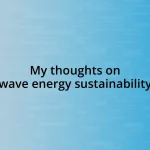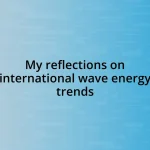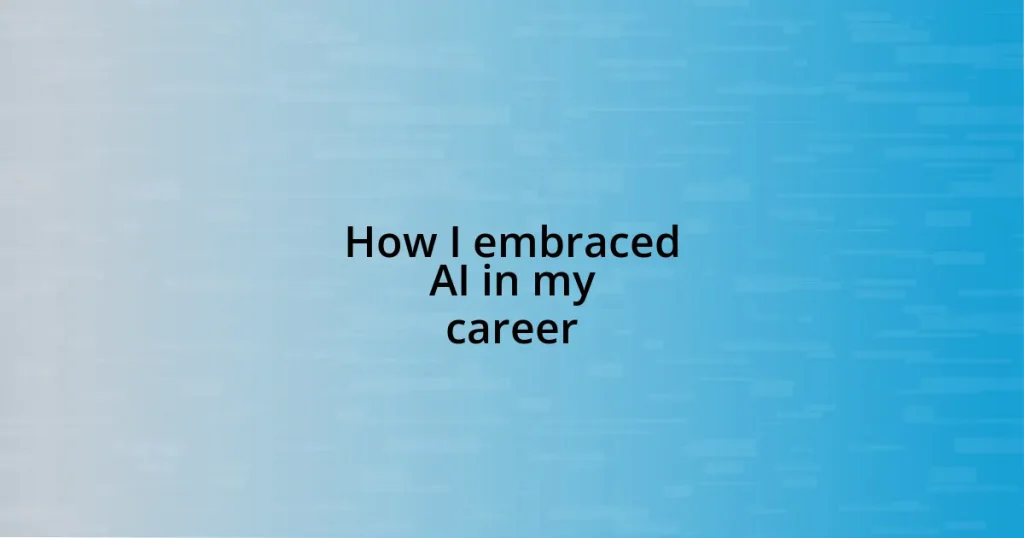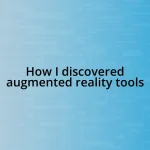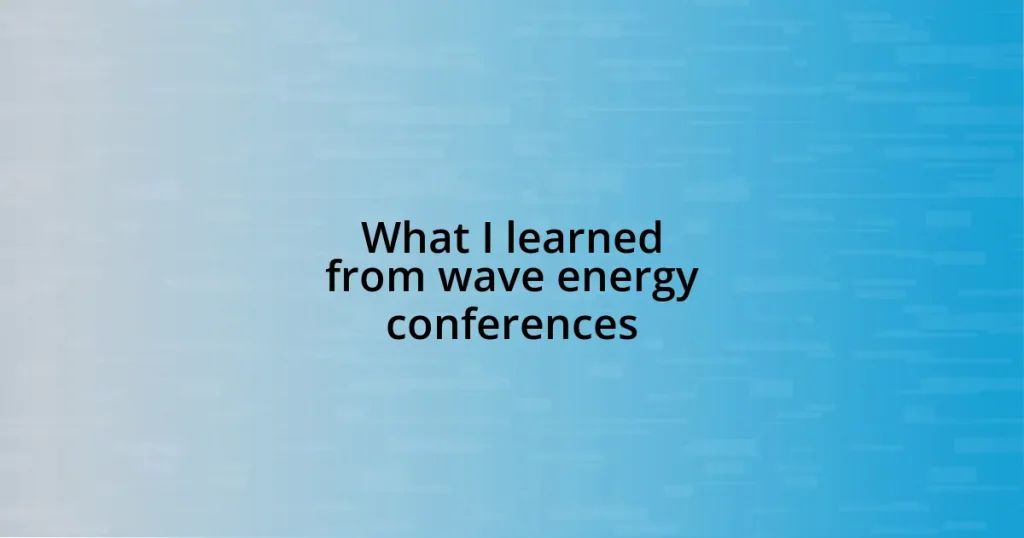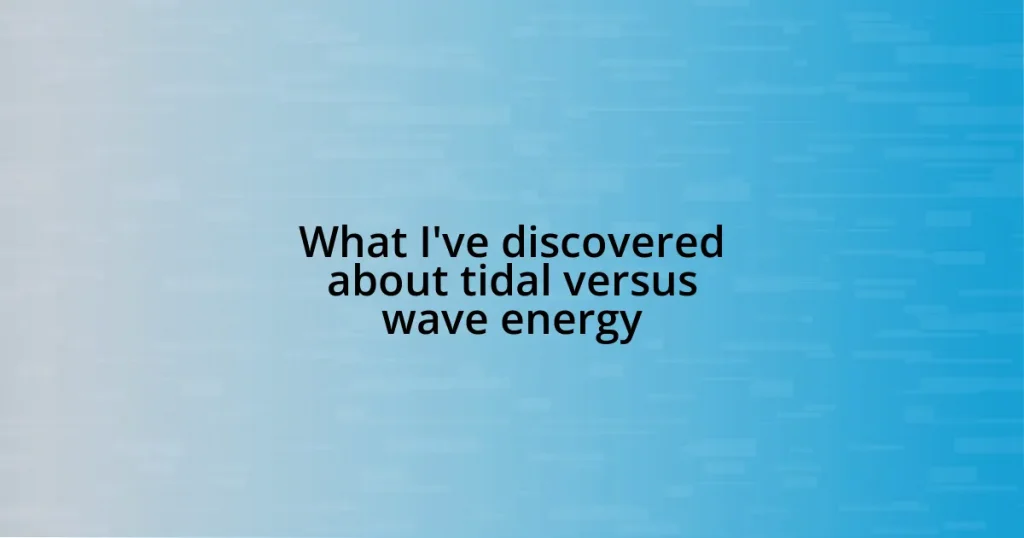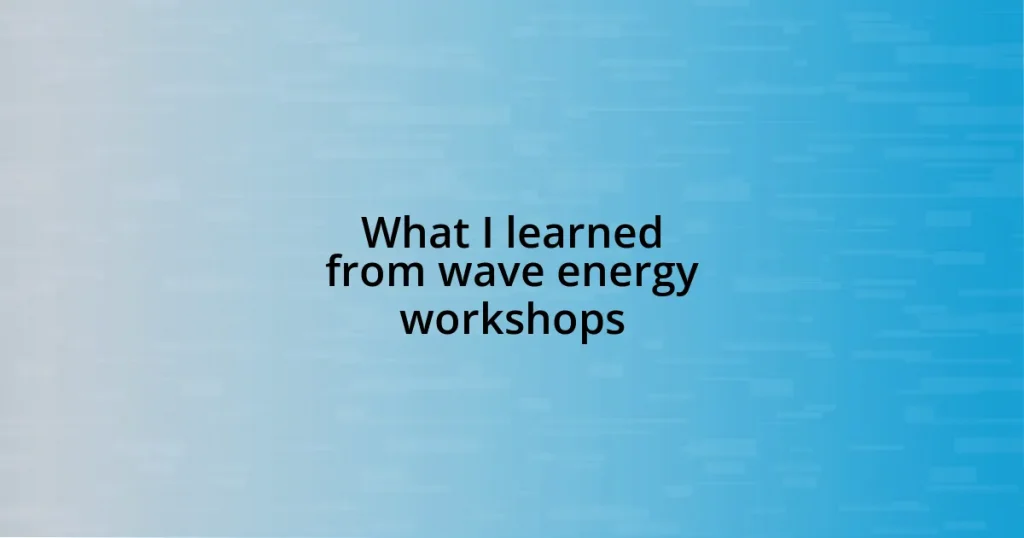Key takeaways:
- Acknowledgment that AI enhances efficiency and creativity, transforming data analysis and inspiring new ideas.
- AI tools have improved team collaboration, minimizing miscommunication and fostering a cohesive work environment.
- Emphasized the importance of overcoming challenges with AI, leading to personal growth and a supportive team atmosphere.
- Recognized the need for future skills like data literacy, adaptability, and effective communication to successfully integrate AI in the workplace.
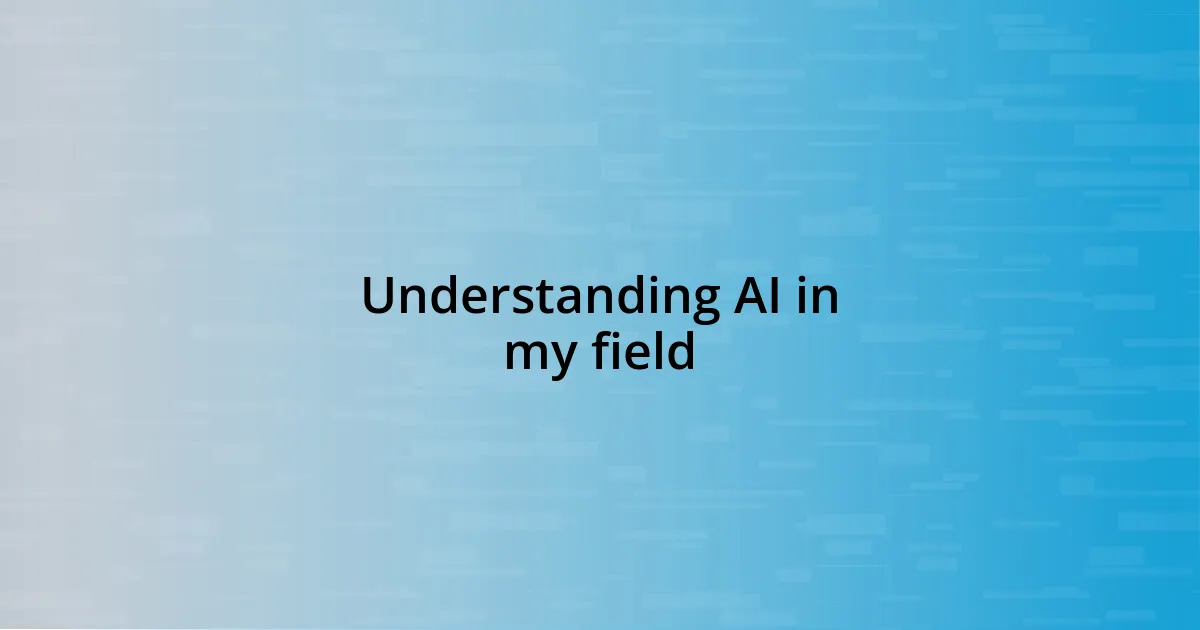
Understanding AI in my field
Understanding AI in my field has been a fascinating journey. When I first stumbled upon AI-driven tools for data analysis, it felt like uncovering a treasure chest. I remember the initial excitement; it was as if I turned on a light in a dark room. Suddenly, insights that once took days to gather were available in mere minutes. How often do we miss valuable information simply because we lack the right tools?
As I delved deeper into machine learning techniques, I realized that AI isn’t just about efficiency; it’s about enhancing creativity. I can’t help but share that when I used an AI tool to generate creative campaign ideas, it sparked a new wave of inspiration within me. Can technology really revive our creative spirits? I firmly believe it can, particularly when it serves as a springboard for human innovation rather than a replacement.
Moreover, AI has changed the dynamics of team collaboration in my workplace. I often reflect on a project where AI tools streamlined communication, allowing everyone to focus on their strengths. Have you ever experienced the frustration of miscommunication among team members? With AI, that frustration has significantly lessened, resulting in a cohesive environment that fosters growth and collaboration. It’s a remarkable transformation, one that has reshaped the way I approach challenges in my field.
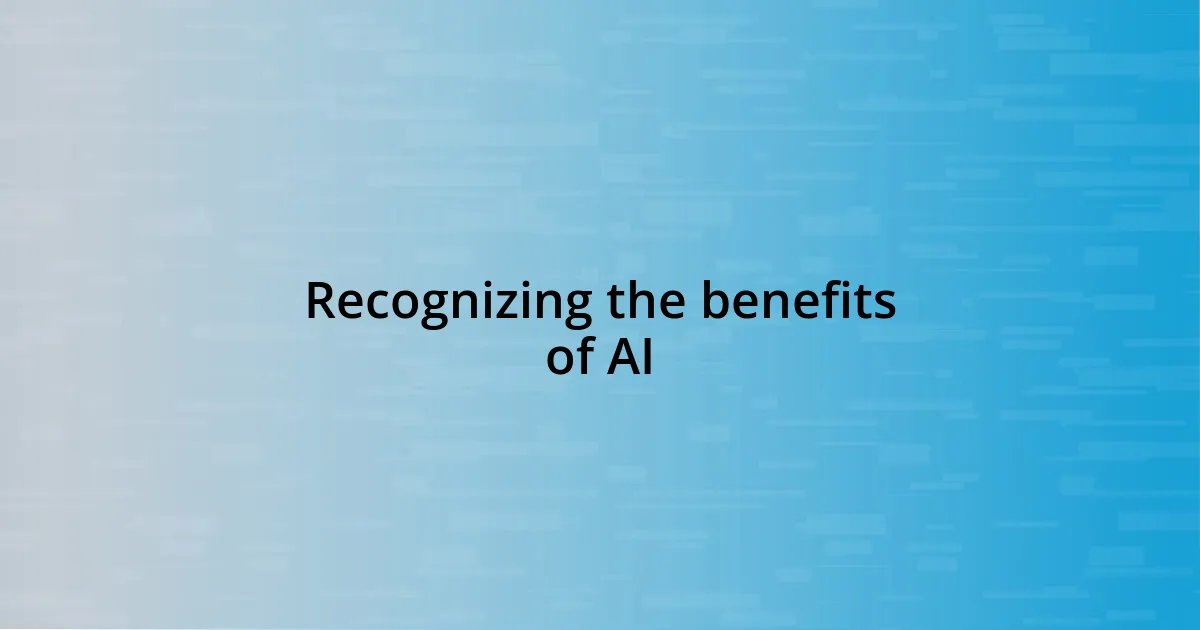
Recognizing the benefits of AI
Recognizing the benefits of AI has opened my eyes to its transformative potential. I remember during a particularly hectic quarter when deadlines were looming, and burnout was creeping in. I started using an AI project management tool that helped organize tasks and predict project timelines. It was like having a virtual assistant who not only kept me on track but also reduced my stress. Have you ever wished for just a bit more time? With AI, I found a way to reclaim lost hours and focus on what truly mattered.
Beyond efficiency, AI has significantly enriched the qualitative aspects of my work. I had a moment while analyzing customer feedback; an AI tool extracted sentiments that I had initially overlooked. It felt exhilarating to discover themes that resonated deeply with our audience. How often do we skim the surface of data without understanding the heart of it? By leveraging AI for deeper insights, I’ve developed a stronger connection with my customers, enabling me to craft more personalized experiences.
Moreover, I’ve seen how AI fosters a culture of continuous learning in my team. When we integrated an AI-powered learning platform, it encouraged my colleagues to take charge of their development. I’ve witnessed friends finding new passions through tailored recommendations, like discovering coding skills they never knew they had. Isn’t it incredible when technology not only assists but empowers individuals? This shift has made our workplace not just a place of productivity, but a hub of growth and discovery.
| Benefit | Personal Experience |
|---|---|
| Efficiency | Reclaimed time through AI project management tools |
| Customer Insight | AI revealed overlooked themes in customer feedback |
| Continuous Learning | AI-platform encouraged team members to explore new skills |
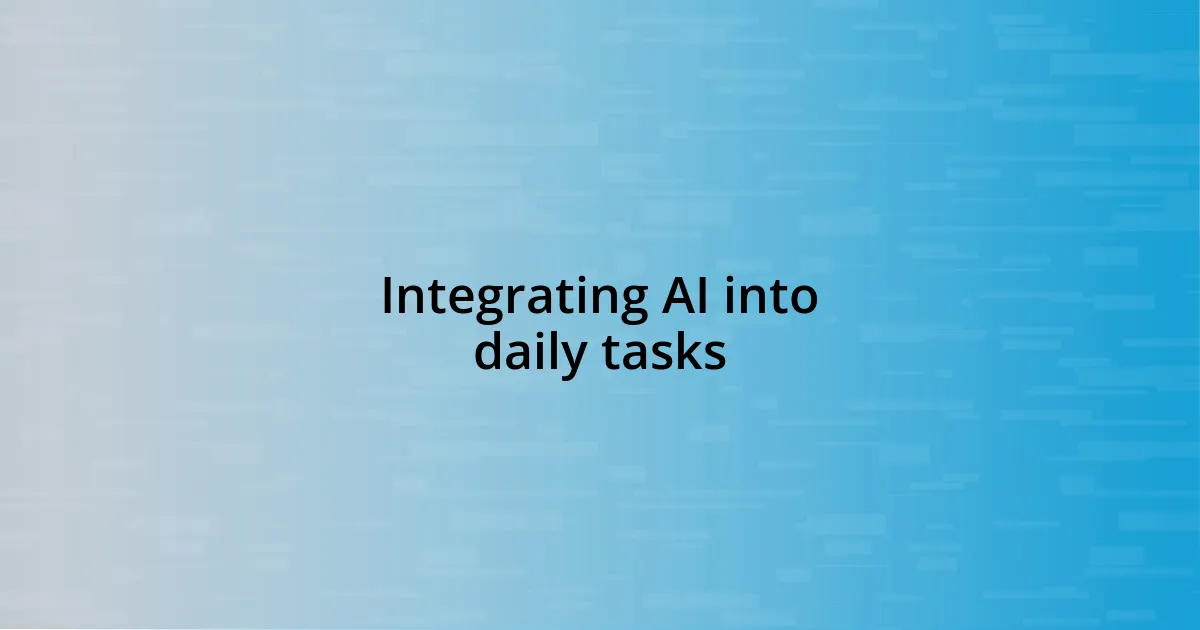
Integrating AI into daily tasks
Integrating AI into my daily tasks has truly modernized my work routine. One of my favorite tools is an AI-based virtual assistant that helps me manage my calendar. I remember a chaotic week when back-to-back meetings left me feeling overwhelmed. I simply dictated my schedule to the AI, and it optimized my appointments, giving me more breathing room. It’s remarkable how a simple adjustment can turn chaos into clarity.
Here’s a look at how AI has seamlessly blended into my daily workflow:
- Task Automation: Repetitive tasks like data entry can now be handled by AI, freeing up my time for more creative pursuits.
- Email Sorting: My AI email assistant prioritizes important messages, ensuring I focus on what matters most.
- Data Analysis: Intriguing patterns emerge effortlessly when I let AI analyze datasets, guiding my decision-making.
- Meeting Summaries: An AI tool that summarizes meetings allows me to revisit key points quickly without sifting through lengthy notes.
In navigating through these enhancements, I often find myself reflecting on how AI has shifted my perspective from simply managing tasks to proactively engaging with them. It feels like I’ve gained a partner in my work, one that complements my skills and amplifies my productivity.
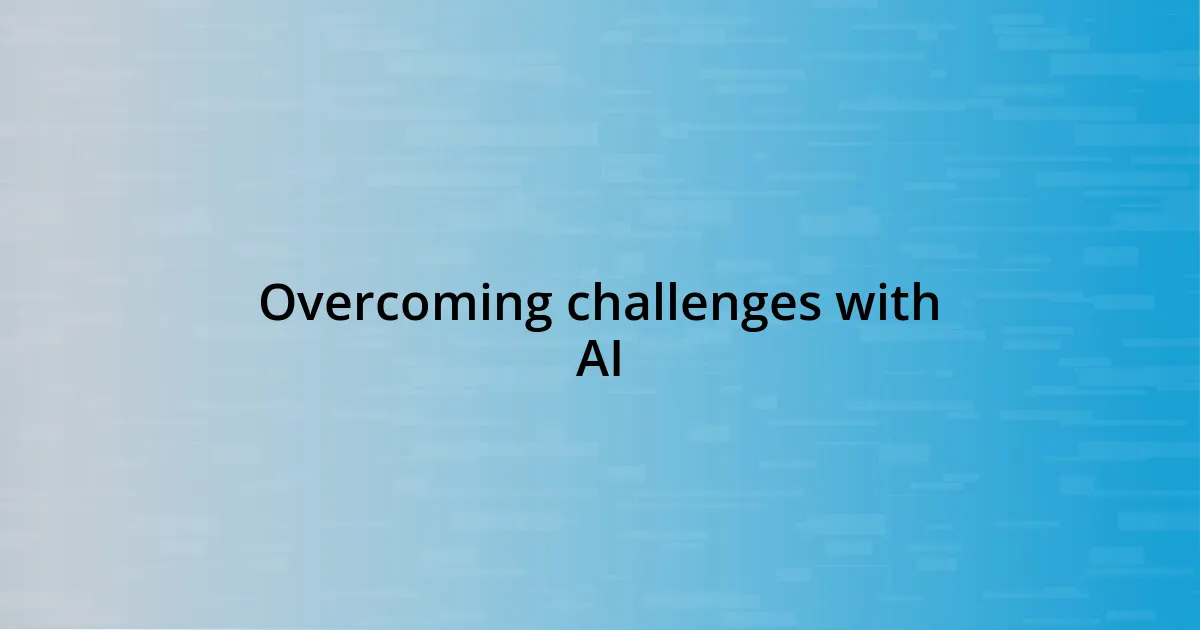
Overcoming challenges with AI
Embracing AI inevitably brought challenges, but those obstacles fostered personal growth. I vividly recall a time when I first tried to implement an AI tool for customer insights. The learning curve was steep, and I wrestled with frustration as I tried to connect the dots between the technology and my existing workflows. Have you ever felt lost in the sea of new tech? I did, but in navigating through that complexity, I found a newfound resilience and curiosity that pushed me to learn more. With every small victory, like successfully interpreting AI-generated data, I realized that overcoming these hurdles was as rewarding as the insights themselves.
Another significant challenge was the skepticism around AI within my team. Initially, some members feared that adopting AI would threaten their roles. It was a tough atmosphere to foster openness. I decided to share my own journey, illustrating how AI had enhanced my capabilities rather than replaced them. I even facilitated a workshop where we brainstormed ways to integrate AI while complementing our unique skills. Isn’t it fascinating how conversation can bridge gaps? By addressing concerns head-on, I helped my colleagues see AI as a supportive ally, igniting a sense of collaboration rather than competition.
Despite these challenges, I always find joy in discovering new ways AI can streamline processes. There’s something so satisfying about troubleshooting and refining AI tools to fit our needs. For instance, when I adjusted an AI scheduling assistant’s settings, it began suggesting breaks during my packed days. I was pleasantly surprised; it’s often so easy to forget the importance of stepping back! Taking breaks feels counterintuitive in a busy workday, but this little tweak not only elevated my productivity but also enhanced my overall well-being. Embracing AI is an ongoing adventure, each hurdle teaching me valuable lessons along the way.
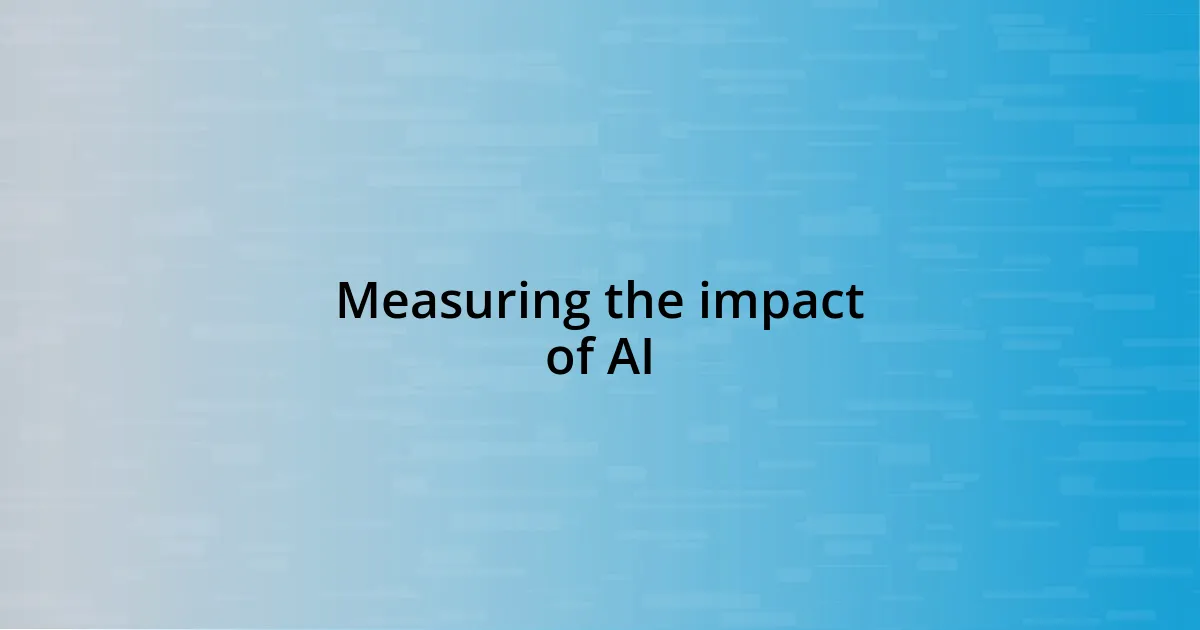
Measuring the impact of AI
Measuring the impact of AI can often feel like navigating through a fog. I remember the first time I attempted to assess how my new AI analytics tool was performing. I was eager to understand its influence on my reporting process, but the numbers didn’t seem to tell a clear story. Have you ever stared at analytics and felt overwhelmed? I certainly have. That realization was a turning point for me; it taught me that metrics must align with real-world outcomes.
After a few months of applying the AI tool, I started to dive deeper into its performance indicators. I began comparing the time I spent on generating reports before and after its implementation. It surprised me to find that I had slashed my reporting time by over 40%. That’s a significant boost! I felt a surge of excitement knowing that I could allocate that extra time toward strategic planning instead of crunching numbers. Tracking such tangible results really brought home the value of embracing AI in my daily work.
However, measuring impact goes beyond just numbers. I also took note of the qualitative changes in my work environment. My teammates began to engage with data insights more proactively, sparking lively discussions during our meetings. I recall a moment when we collectively brainstormed innovative solutions, thanks to insights provided by AI analysis. It made me realize that the emotional and collaborative shifts are as important as the hard metrics. Isn’t it amazing how technology can transform not just our tasks but also our teamwork?
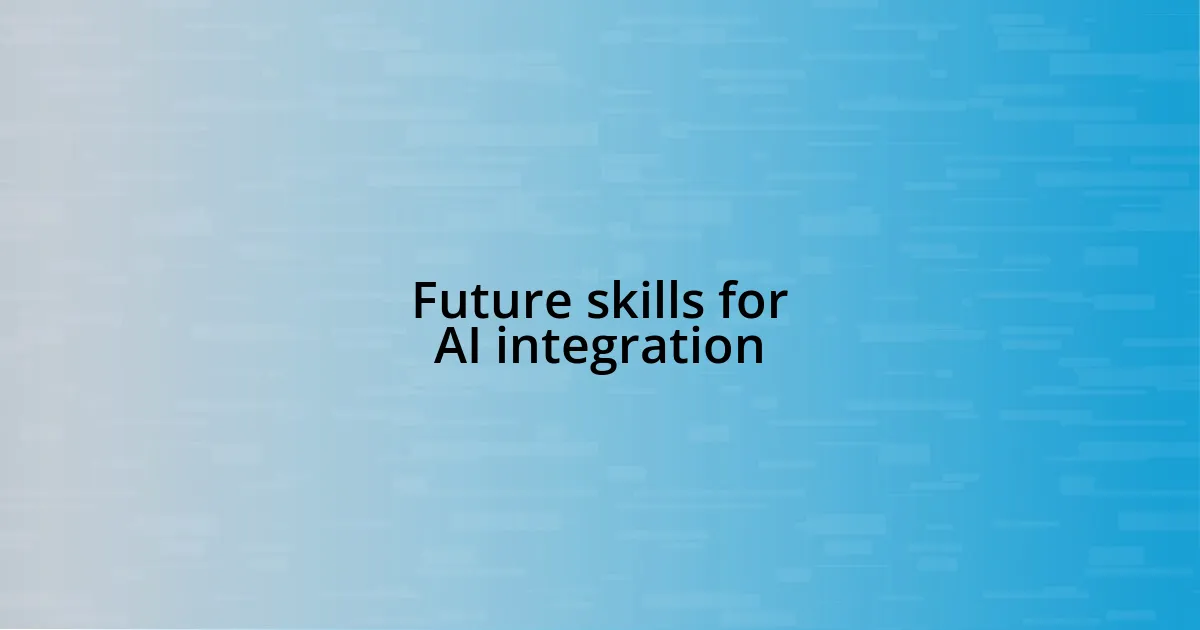
Future skills for AI integration
Acquiring future skills for AI integration has been a game changer in my career. For instance, mastering data literacy was essential; I instantly recognized it as a bridge between technology and effective decision-making. Have you ever felt empowered by understanding raw data? I remember reviewing datasets and suddenly viewing them not just as numbers but as actionable insights that could steer our projects in new directions.
Another skill that proved invaluable was adaptability. Adjusting to rapid changes in AI technologies forced me to think on my feet. I often recall attending a workshop where I was introduced to a cutting-edge AI tool that could automate tedious tasks. Initially, I felt a pang of anxiety—what if I couldn’t keep up? Yet, that very discomfort nudged me to embrace continuous learning. I dove into tutorials and soon found myself not just using the tool but even training my colleagues. Isn’t it fascinating how discomfort can morph into a powerful motivator?
Lastly, effective communication emerged as a crucial skill for collaboration. Engaging with team members about AI’s role in our work was transformative. I vividly remember organizing a brainstorming session where we dissected how different AI applications could enhance our existing processes. It was during this meeting that I realized that fostering an environment where everyone felt heard not only improved our morale but also led to innovative ideas we hadn’t considered before. Have you experienced the magic of collective brainstorming? It’s incredible what happens when you create a space where everyone’s input matters.





